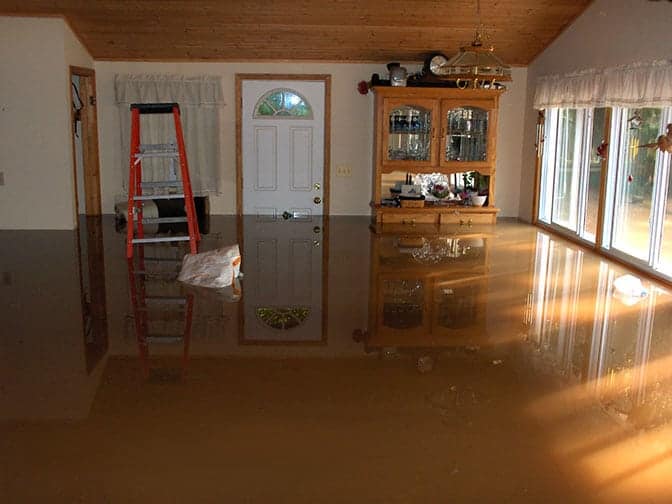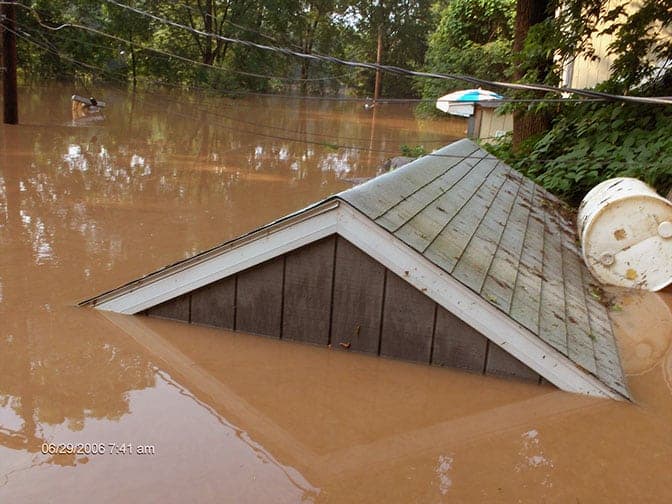Delaware resident spreads word about flood risk through nonprofit
DIANE THARP is the executive director of the North Delaware River Watershed Conservancy. According to its Facebook page, "NorDel works closely with various government representatives and stakeholders in order to restore the equitable apportionment of water in the Delaware River Basin."
With New Jersey's apparent refusal to agree to another annual extension of the Flexible Flow Management Plan, Tharp is concerned about an increased risk of flooding.
Tharp shares a home with her husband on the Delaware River near Stroudsburg, Pa. In 2004 and 2005, there were two 100-year floods that caused severe damage to the property.
"We hadn't experienced a flood like that since 1955," Tharp said. "In 1955, we had back-to-back hurricanes with over 22 inches of rainfall within a week. In 2004 and 2005, it was about 6.5 inches of rain. I started looking to see how the New York City reservoirs affected the amount of water coming into the Delaware. In 2005, I started contacting congressmen and anybody that would listen, to try to warn them. I knew that because the reservoirs were kept at 100 percent full when we had rainfall, immediately they would begin to spill. They were even spilling prior to the rainfall that the river had already risen."
Tharp and her husband finished restoring and rebuilding their home in 2006. That same year, they were surprised when yet another flood came.
"Normally, you would not experience three of those within three years," Tharp said. "So when that happens you start to look for other reasons that you experience those highs."
Tharp began noticing that these floods went beyond what was listed on charts about maximum flood stages. Her next step was to figure out why that was.
"I had 2 1/2 feet of water in my second floor in 2005 and 2006," she said. "And a foot below the second floor in 2004. So these were not just the normal type of flooding."
Tharp spoke to the Delaware River Basin Commission after the 2006 flood. She also got the backing of some local politicians and spoke before the Republican Policy Committee at Shawnee Inn. The Republican Party Committee then went to the governor of Pennsylvania, Ed Rendell. The governors of Delaware, New Jersey, Pennsylvania, and New York formed a task force to examine flooding on the Delaware. They asked the DRBC to start looking at flood mitigation and how these kinds of floods could be prevented in the future.
(Comments from the DRBC are included at the end of the related story "So what happens if the FFMP isn't renewed?")
"It becomes a very complicated issue, because New York City owns the three water supply reservoirs that feed into the Delaware River," Tharp said. "They're not controlled by the Army Corps of Engineers. The Army Corps dams in Pennsylvania can be used for flood control because the Army Corps owns them."
Tharp is concerned that New Jersey said it wouldn't consider renewing the plan again until certain issues are agreed upon by everybody. New Jersey wants these issues to be resolved by the deadline on May 31, 2017. According to Tharp, solving these problems by that date is impossible.
"What I am advocating is that rather than allowing the plan to lapse," Tharp says, "that New Jersey submits to the decree parties for review the necessary language that can be added to the FFMP that will set forth the timeline and the precise steps needed to scientifically address those issues since there's been a stalemate for five years. Why let this plan lapse?"
Tharp added that if the FFMP isn't renewed, there will be no flood mitigation whatsoever. The goal of North Delaware River Watershed Conservancy is to get the most equitable plan for the Delaware River Basin to prevent flooding.
"Basically I go to the meetings with the principals," she said of her role as Executive Director. "I go to the DRBC meetings. I keep in touch with the New York City DEP, the New Jersey DEP, and the Pennsylvania DEP. I go to Harrisburg, Albany, and wherever else I have to go to try to effect the change necessary to get this equitable plan."
Right now, getting the FFMP to remain in place is the organization's primary focus. Tharp said there is a key to the progress she's helped make so far.
"I've found that success comes from producing facts for people, not necessarily from emotion. We were all emotional when we lost our homes. But instead of showing emotion, I went out and researched it and found the facts to make change happen."







